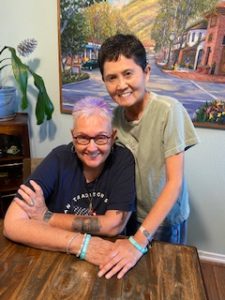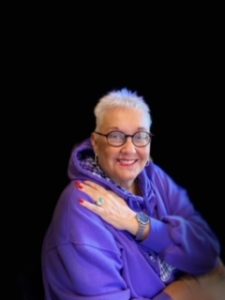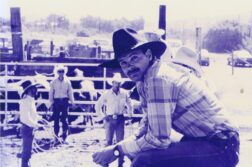I’m pulling into the drive thru at Del Taco on a Thursday evening after seeing my therapist. I’m salivating for their bean and cheese burrito with extra cheese, tomatoes, and sour cream. Red sauce too. “That will be $5.25,” the clerk said. I reach into my purse and pull out my small gray coin purse with a pink ostrich on it. The words imprinted on the back, “Glad to be me.” Was I really glad to be me at that moment? Or deep down inside did I wish to be someone else? After all, I was digging for quarters.
The first savory bite into my burrito dripped of sour cream and red sauce. The extra cheese was stringy and hung on my lower lip. Already, I was feeling better about my few quarters I just used because I had my favorite burrito on a Thursday night that had become my ritual. I deserved it. After all, Karen’s first hospital bill was 1.5 million dollars. I was just spending $5.25.
Eleven years ago, my wife suffered a ruptured brain aneurysm. She was 55 and I was 50 years old. She hasn’t been able to work since. Her frontal lobe took the biggest hit. Our frontal lobe is the executive center for everything we do. Karen was on a feeding tube for months; she was placed in a medically induced coma for six weeks and she coded twice in one month. She had a less than one percent chance of living. After five arduous months, I finally was able to bring Karen home. That’s when the financial hardship began.
We lost her $85,000 yearly income. Her yearly disability income was $28,000. It’s true that many people live on a lot less. My digging for quarters at month’s end seemed ludicrous to some. But in the ten years since the brain aneurysm, we have written checks for over $300,000 for caregivers, without whom Karen can’t survive. I love my wife and I wanted to stay the course with her no matter where it took us. But I must admit, I never saw me exhuming quarters for a burrito for my evening meal.
Before Karen’s ruptured brain aneurysm, I’d heard over and over that a catastrophic event could take you to your knees financially. But really, whoever thinks your family will be hit? We didn’t.

When I was young, I never learned how to budget money. As an adult I never learned either. If I had money I would spend it. I wore clothes from stores like Nordstrom, Macys, and I loved the thrill of a smooth and fast ride in our BMW.
In the past eleven years, money became tighter and tighter for Karen and me, due to caretaking bills, a house payment, car payments, and more that must be paid every month. When I’m teaching I need someone at home with Karen. She has short-term memory loss, balance issues, she may give the dogs too many cookies and she cannot drive so she can’t get to any therapies on her own. Someone must drive her.
On weekends I hired a weekend college student to be a caretaker for Karen for four hours before I would drive to Coffee Bean where I met friends and eventually wrote my entire memoir, Where There is Breath, There is Life. The caretaker would have Karen showered, fed, and the household chores finished by the time I returned home. But, I had to wonder, should I have saved this weekend money and not used a weekend caretaker? It would have saved us $240.00 a month.
After all, how difficult is it to take care of your loved one with a brain injury after you have worked teaching 160 eighth graders a day? When I arrived home each day from teaching and the caretaker left, I had a laundry list of duties waiting for me. Karen needed her dinner made., The dishes needed to be done. She needed to be helped to the restroom. Getting her a glass of water was my job, as was getting her nighttime pills from her pill box, getting her dressed for bed, and finally putting her bedrail up.
We had no rainy-day savings account. The one where you’re supposed to save enough money to cover maybe six months of bills. I was saving $1100.00 a month in my retirement account before Karen’s aneurysm. She was saving $400.00 a month in hers. We had two homes, one we paid and the other one had renters, so they paid the mortgage. Instead of investing $3000.00 a month, we were now writing checks for over $3000.00 a month.
One day in the time before, I saw my gray coin purse at the car wash and bought it. Maybe I should have been washing my car myself. I could have saved money and not bought the coin purse either. But a rainy-day account wouldn’t have been enough money anyway.
Because of our age when the catastrophic event happened, we were nowhere near retirement. We had many years to work and build our nest egg. Faced with insurmountable bills, how would we be able to pay our monthly expenses? Credit card limits were used up. My brother helped with loaning money for our house payment. My best friend gave and loaned us money. That’s how we paid some of our bills. But then came my little gray purse, filled with quarters—stretching every coin until the next check, the next payday.
Living in the world of brain abyss with Karen, I still was, as the purse said, glad to be me. I had love and integrity. I stayed when everyone else walked away. I lined up the best caretakers I could find for Karen made sure she had everything she needed and came home happy that she lived. We had one another and our three dogs.
The quarters. I was elated to have them, but I felt so despondent. Whether it was one quarter or two dimes and a nickel, dipping my long slender fingers into the dark chasm of my little gray coin purse, made me feel scared. Karen and I both had pride, a strong work ethic and the ability to make a nice salary and that all changed in one minute.
Why did I need to buy six cars in ten years? Was it to cover up the pain I was feeling for the part of my wife I had lost? Was it because I felt “cool” driving my 535 BMW around town? Yes, I felt cool and it was probably the only time in many years that I felt cool and in control when I was driving one of my many BMW cars. They were fast, they hugged the road, and I loved every minute of driving one.
How much money is really needed to care for a loved one with a brain injury? There is no manual to answer this. As I look back on our ten-year anniversary of my wife’s brain aneurysm, I see places where perhaps I could have saved money by not having a caretaker. However, at what point does my sanity take a hit and then doctor bills mount for me? It is a balance that I’m not sure I have learned yet. I have spent over $80,000 in tuition to fly across country for two master’s degrees. While I was back east Karen needed 24-hour caretakers. Was that the smartest thing for me to do? Maybe. It has given me 20 days of respite times 10, a place to learn, write and relax, and a place where I wasn’t in charge of anyone or anything but me.
I’m graduating soon with my second Masters, an MFA in writing. Karen can now cook her own breakfast, make my lunch, do laundry, feed the pups, and work her iPad. But we still need a daily caretaker while I’m at work and when I go back east to Fairfield University to graduate this July.
We have both come a long way from that devastating day in 2008 that altered our lives forever. Even to the point of digging for quarters in my sweet, small gray coin purse with the image of an ostrich and the words: I’m glad to be me.
Susan M. Davis has been a teacher for 28.5 years. She currently has two MFA degrees in Creative Writing and is currently working on a third at Fairfield University. She also have a Masters Degree in Educational Counseling. Susan and her wife Karen have been together for sixteen years and married for six. On July 28, 2008, Karen suffered a ruptured brain aneurysm. “Quarters” is the story of how they lived while paying out over one million dollars in caretaking bills. Susan lives in Southern California with her wife and their three puppies.







Discussion3 Comments
Great. So moving. You have learned a lot and grown even more. Turning an adversity into a blessing
Your commitment to Karen and to love is inspirational. Growing up I never heard about LGBTQ+ relationships. I want to thank you for sharing your story and sharing your love for Karen.
Javier: Thank you my sweet student. I love this essay. I think it speaks volumes. Thank you for taking the time to read it.
Big hugs,…..Ms. Davis